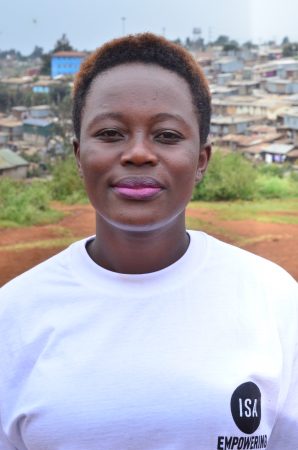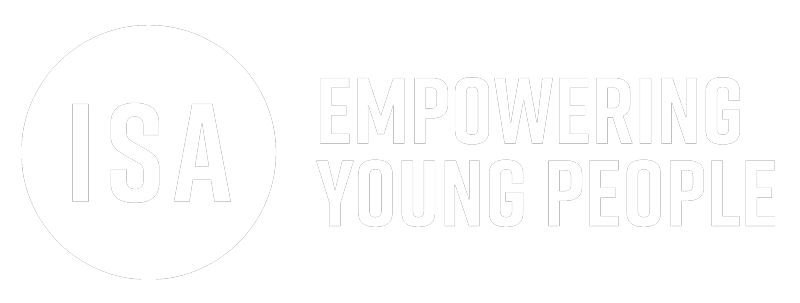
Carolyne Ndalilah, director of Kenyan youth organisation TYSA, helps young people to get to know themselves and the challenges of their community. “What our society needs are young people who think beyond tomorrow; who see it as a challenge to try the impossible.”
It is a wonderful story: from beneficiary of TYSA’s projects to director of the same organisation. It is the road that Carolyne Ndalilah (25) has traveled in ten years. She was fifteen when Transforming Young Stars of Africa (TYSA) came into her life. An organisation in and around the city of Kitale, in north-western Kenya. TYSA’s mission is clear: if you create safe places for young people where they can come together, and if young people have the opportunity to be involved in decision-making processes, you can really change a society positively.
In the third grade of high school, Ndalilah became involved with the organisation. “TYSA was focused on looking out for vulnerable groups in society, such as teenage mothers and young people without parents.” Ndalilah herself had become a mother of a daughter from an involuntary pregnancy and saw a different future ahead at that time. TYSA’s activities changed that. “I came into contact with other groups of young people from the area. During the weekends we did empowerment sessions and during the holidays we went camping together. We shared our life stories with each other. Here I noticed that I was still better off than others who had gone through much heavier times and for example had already given up their hopes for education.”
“What I mainly learned,” she continues, “was to never give up hope in whatever you do. TYSA’s activities were very focused on taking positive action and having confidence in yourself. It was also very important to me personally that the TYSA staff made it clear that having a child while you are still in school is not a crime at all. “
Different person
Ndalilah claims to be a completely different person now than ten years ago. The new confidence also radiated directly to her father. “I really never thought I would ever have the opportunity to study after high school. When my father saw how much I had developed through TYSA, he said, ‘I believe in you and we will see how we can fund your studies.’ He sold a piece of land to pay for my studies and rent me a room in the city.”
She went to study social work at the Eldoret College of Professional Studies, but soon found out that her father had been a little too optimistic. Laughing: “He thought he paid for the entire study, but it was only for one module. I did not dare to tell him that, because my daughter was there with seven people at home which was already very difficult financially.”
So creativity was needed to get the rest of the tuition fees together. She found work in a salon where she braided women’s hair.
When the salon had to close due to problems, Ndalilah felt for a moment that everything was lost. But again she was creative. “I learned from a friend how to make liquid soap myself. I poured it into half liter bottles that I sold for 50 shillings (about 40 cents, ed.) each. Until three o’clock in the afternoon I went from door to door and then quickly back to my studies.” With a big smile on her face she says: “I made a real profit. That way I was not only able to pay for the rest of my studies, but I was also able to send money to my parents.”
Passion for young people
After completing her three-year degree, she did an internship with a government organisation that provides scholarships. In addition, she remained very active with TYSA and moved up the hierarchy of the organisation. This work in particular gave her great satisfaction. “I have a passion for children and young people and find it very important that they get to know their rights. And I love mentorship: guiding others and helping them see themselves grow. Mentorship is all about helping others realise who they are, what the challenges in their community are and how to address them. “
There are still plenty of challenges. Although Ndalilah sees that it is becoming more common for boys and girls to exercise together and to see more gender peers who are empowered, there are still many prejudices and stigmas. “Certainly in remote areas, people still believe that women are there to do housework, while men are in charge of the family and are allowed to give orders. We still have regular conversations with parents in which only the father does the talking and says that a girl after primary school should not attend further education and is supposed to get married as soon as possible. The woman really has no voice there. Then I thank God that there are organisations like TYSA that stand up to this and start talking about it. “
Role models
Since the beginning of this year, she has been the head of the organisation, which put Ndalilah forward to become the new director. “TYSA believes in the power of young people as leaders and role models in the community,” she says. “As someone who has gone through all stages of TYSA’s leadership programmes, I am a proud product of that myself.”
Her main ambitions are to make the working method of TYSA even more known so that it also inspires other civil society organisations, to bring even more girls into leadership and to highlight even more female role models. “What our society needs are open-minded young people who think beyond tomorrow; young people who see it as a challenge to try out the impossible. My life motto is that you should never give up on anything. In life, you should not be afraid to lose, but be afraid to give up. Giving up is worse than losing.”
Her contract with TYSA runs until December 2022. Then she will make place for yet another young person who the organisation itself will produce. Ndalilah already knows what her next challenge is. “My dream is to get a PHD and graduate in social work.”

